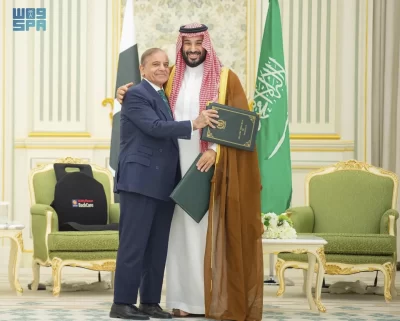
UNITED NATIONS— France, Germany and the United Kingdom moved Thursday to reimpose United Nations sanctions on Iran over its nuclear program, further isolating Tehran after its atomic sites were repeatedly bombed during a 12-day war with Israel.
The process, termed a “snapback” by the diplomats who negotiated it into Iran’s 2015 nuclear deal with world powers, was designed to be veto-proof at the U.N. and could take effect in a month.
It would again freeze Iranian assets abroad, halt arms deals with Tehran and penalize any development of Iran’s ballistic missile program, among other measures, further squeezing the country’s reeling economy.
The move starts a 30-day clock for sanctions to return, a period that likely will see intensified diplomacy from Iran, whose refusal to cooperate with inspectors from the International Atomic Energy Agency, or IAEA, started the crisis. Iran will also probably emerge as a top focus of the U.N. General Assembly when it meets next month in New York.
The British, French and German foreign ministers suggested that they viewed the snapback as a way to spur negotiations with Tehran.
“This measure does not signal the end of diplomacy: we are determined to make the most of the 30-day period that is now opening to engage in dialogue with Iran,” French Foreign Minister Jean-Noël Barrot wrote on the social platform X.
But Iran immediately decried the move, with Foreign Minister Abbas Araghchi saying it was “unjustified” and “lacking any legal basis” in a call with his European counterparts.
“The Islamic Republic of Iran will respond appropriately to this unlawful and unwarranted measure,” he said. Hours later, the Iranian Foreign Ministry said in a statement that the move by the European countries will “gravely undermine” its ongoing cooperation with the U.N. nuclear watchdog agency.
In the past, Iran has threatened to withdraw from the Nuclear Nonproliferation Treaty, potentially following North Korea, which abandoned the treaty in 2003 and then built atomic weapons.
Europeans warned Iran about return of sanctions
The three European nations warned Aug. 8 that Iran could trigger the snapback when it halted inspections by the IAEA after Israeli strikes at the start of the two countries’ 12-day war in June. The Israeli attacks killed Tehran’s top military leaders and chased Supreme Leader Ayatollah Ali Khamenei into hiding.
The European nations triggered the sanctions process through a letter to the U.N. Security Council. France and the U.K. also requested that the 15-member council hold closed consultations Friday to discuss Iran’s noncompliance, according to a diplomat who spoke on condition of anonymity to discuss still-private information.
U.S. Secretary of State Marco Rubio praised the Europeans’ decision and said America “remains available for direct engagement with Iran.” “Snapback does not contradict our earnest readiness for diplomacy; it only enhances it,” Rubio said in a statement.
Using the snapback mechanism will likely heighten tensions between Iran and the West in a region still burning over the Israel-Hamas war in the Gaza Strip. As the measure was announced, Israel launched strikes targeting Yemen’s Iran-backed Houthi rebels.



